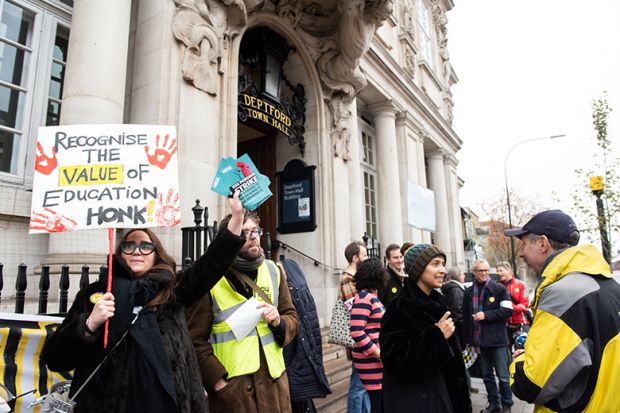Employers have made an improved pay offer as strike action looms in the UK university sector, but unions said it did not go far enough.
The Universities and Colleges Employers Association (Ucea) upped its previous offer of between 4 and 7 per cent to between 5 and 8 per cent, with the highest rises for those on the lowest pay bands.
It was revealed at the last scheduled meeting of the pay negotiations for 2023-24, one of the last chances to avert 18 days of strike action planned for February and March.
Ucea said the offer represented the “highest uplift in nearly 20 years” and “recognises the current cost pressures faced by both employees and employers”.
Between 3.2 per cent and 2 per cent would be paid from 1 February with the remaining uplift following from 1 August. Roughly half of staff will be eligible for an increment up to a value of 3 per cent on top of the pay award, Ucea said.
The University and College Union (UCU) said the “marginally improved offer” was “still well below inflation and does nothing for years of pay degradation”.
UCU general secretary Jo Grady said the revised offer was “welcome and testament to the effective strike action our union has delivered”.
“However, it is immediately clear this offer will do little to protect our members in a cost-of-living-crisis, nor is it at the limit of what a sector with over £40 billion in reserves can afford,” she said.
“The offer is another devastating real-terms pay cut for tens of thousands of our members, following over a decade of below-inflation pay awards.”
Dr Grady said a “much-improved offer on pay needs to be made alongside serious commitments to end the sector’s reliance on insecure contracts and alleviate dangerously high workloads”, adding that UCU and the other higher education trade unions “remain in dispute but determined to reach a negotiated settlement”.
“There is more than enough time for employers to find a way forward that avoids widespread disruption,” Dr Grady said.
George Boyne, the chair of Ucea, said the “full and final pay offer” would be “financially challenging for the majority of our HE institutions”.
“But employers did permit us to accelerate this process and push the pay packet to the sector’s limits, and that is what we have done,” said Professor Boyne, principal of the University of Aberdeen.
“Clearly the difficult inflationary costs are a joint concern for employees and employers alike but, recognising how inflation disproportionately affects lower paid staff, employers committed to implementing a proportion of this award six months early.”
Professor Boyne called on the trade unions to “consult their individual members in carefully considering this detailed final offer to allow the interim pay uplift to reach staff as soon as possible”.
Ucea said trade unions agreed that action on issues such as casualisation, workload and equality pay gaps will be discussed in separate talks.




